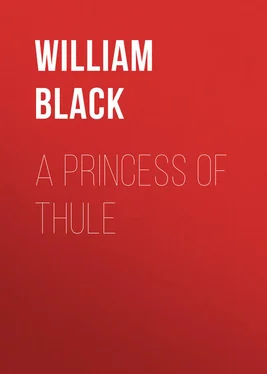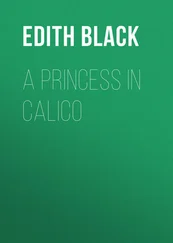William Black - A Princess of Thule
Здесь есть возможность читать онлайн «William Black - A Princess of Thule» — ознакомительный отрывок электронной книги совершенно бесплатно, а после прочтения отрывка купить полную версию. В некоторых случаях можно слушать аудио, скачать через торрент в формате fb2 и присутствует краткое содержание. Жанр: foreign_antique, foreign_prose, на английском языке. Описание произведения, (предисловие) а так же отзывы посетителей доступны на портале библиотеки ЛибКат.
- Название:A Princess of Thule
- Автор:
- Жанр:
- Год:неизвестен
- ISBN:нет данных
- Рейтинг книги:3 / 5. Голосов: 1
-
Избранное:Добавить в избранное
- Отзывы:
-
Ваша оценка:
- 60
- 1
- 2
- 3
- 4
- 5
A Princess of Thule: краткое содержание, описание и аннотация
Предлагаем к чтению аннотацию, описание, краткое содержание или предисловие (зависит от того, что написал сам автор книги «A Princess of Thule»). Если вы не нашли необходимую информацию о книге — напишите в комментариях, мы постараемся отыскать её.
A Princess of Thule — читать онлайн ознакомительный отрывок
Ниже представлен текст книги, разбитый по страницам. Система сохранения места последней прочитанной страницы, позволяет с удобством читать онлайн бесплатно книгу «A Princess of Thule», без необходимости каждый раз заново искать на чём Вы остановились. Поставьте закладку, и сможете в любой момент перейти на страницу, на которой закончили чтение.
Интервал:
Закладка:
At last they were nearing the King of Borva’s home, and Ingram began to study the appearance of the neighboring shores, as if he would pick out some feature of the island he remembered. The white foam hissed down the side of the open boat. The sun burned hot on the brown sail. Far away over the shining plain the salmon were leaping into the air, catching a quick glint of silver on their scales before they splashed again into the water. Half a dozen sea-pyes, with their beautiful black and white plumage and scarlet beaks and feet, flew screaming out from the rocks and swept in rapid circles above the boat. A long flight of solan geese could just be seen slowly sailing along the westward horizon. As the small craft got out toward the sea the breeze freshened slightly, and she lay over somewhat as the brine-laden winds caught her and tingled on the cheeks of her passengers from the softer South. Finally, as the great channel widened out, and the various smaller islands disappeared behind, Ingram touched his companion on the shoulder, looked over to a long and low line of rock and hill, and said, “Borva!”
And this was Borva! – nothing visible but an indefinite extent of rocky shore, with here and there a bay of white sand, and over that a table-land of green pasture, apparently uninhabited.
“There are not many people on the island,” said Lavender, who seemed rather disappointed with the look of the place.
“There are three hundred,” said Mackenzie with the air of one who had experienced the difficulties of ruling over three hundred islanders.
He had scarcely spoken when his attention was called by Duncan to some object that the gillie had been regarding for some minutes back.
“Yes, it is Miss Sheila,” said Duncan.
A sort of flush of expectation passed over Lavender’s face, and he sprang to his feet. Ingram laughed. Did the foolish youth fancy he could see half as far as this gray-eyed, eagle-faced man, who had now sunk into his accustomed seat by the mast? There was nothing visible to ordinary eyes but a speck of a boat, with a single sail up, which was, apparently, in the distance, running in for Borva.
“Ay, ay, ay,” said Mackenzie in a vexed way, “it is Sheila, true enough; and what will she do out in the boat at this time, when she wass to be at home to receive the gentlemen that hef come all the way from London?”
“Well, Mr. Mackenzie,” said Lavender, “I should be sorry to think that our coming had interfered in any way whatever with your daughter’s amusements.”
“Amusements!” said the old man with a look of surprise. “It iss not amusements she will go for; that is no amusements for her. It is for some teffle of a purpose she will go, when it iss the house that is the proper place for her, with friends coming from so great a journey.”
Presently it became clear that a race between the two boats was inevitable, both of them making for the same point. Mackenzie would take no notice of such a thing, but there was a grave smile on Duncan’s face, and something like a look of pride in his keen eyes.
“There iss no one, not one,” he said, almost to himself, “will take her in better that Miss Sheila – not one in ta island. And it wass me tat learnt her every bit o’ ta steering about Borva.”
The strangers could now make out that in the other boat there were two girls – one seated in the stern, the other by the mast. Ingram took out his handkerchief and waved it: a similar token of recognition was floated out from the other vessel. But Mackenzie’s boat presently had the better of the wind, and slowly drew on ahead, until, when her passengers landed on the rude stone quay, they found the other and smaller craft still some little distance off.
Lavender paid little attention to his luggage. He let Duncan do with it what he liked. He was watching the small boat coming in, and getting a little impatient, and perhaps a little nervous, in waiting for a glimpse of the young lady in the stern. He could vaguely make out that she had an abundance of dark hair looped up; that she wore a small straw hat with a short white feather in it; and that, for the rest, she seemed to be habited entirely in some rough and close-fitting costume of dark blue. Or was there a glimmer of a band of rose-red around her neck?
The small boat was cleverly run alongside the jetty: Duncan caught her bow and held her fast, and Miss Sheila, with a heavy string of lythe in her right hand, stepped, laughing and blushing, on to the quay. Ingram was there. She dropped the fish on the stones and took his two hands in hers, and without uttering a word, looked a glad welcome into his face. It was a face capable of saying unwritten things – fine and delicate in form, and yet full of an abundance of health and good spirits that shone in deep gray-blue eyes. Lavender’s first emotion was one of surprise that he should have heard this handsome, well-knit and proud-featured girl called “little Sheila,” and spoken of in a pretty and caressing way. He thought there was something almost majestic in her figure, in the poising of her head and the outline of her face. But presently he began to perceive some singular suggestions of sensitiveness and meekness in the low, sweet brow, in the short and exquisitely curved upper lip, and in the look of the tender blue eyes, which had long, black eyelashes to give them a peculiar and indefinable charm. All this he noticed hastily and timidly as he heard Ingram, who still held the girl’s hands in his, saying, “Well, Sheila, and you haven’t quite forgotten me? And you are grown such a woman now: why, I musn’t call you Sheila any more, I think. But let me introduce you to my friend, who has come all the way from London to see all the wonderful things at Borva.”
If there was any embarrassment or blushing during that simple ceremony it was not on the side of the Highland girl, for she frankly shook hands with him and said, “Are you very well?”
The second impression which Lavender gathered from her was, that nowhere in the world was English pronounced so beautifully as in the Island of Lewis. The gentle intonation with which she spoke was so tender and touching – the slight dwelling on the e in “very” and “well” seemed to have such a sound of sincerity about it that he could have fancied he had been a friend of hers for a lifetime. And if she said “ferry” for “very,” what then? It was the most beautiful English he had ever heard.
The party now moved off toward the shore, above the long white curve of which Mackenzie’s house was visible. The old man himself led the way, and had, by his silence, apparently not quite forgiven his daughter for having been absent from home when his guests arrived.
“Now, Sheila,” said Ingram, “tell me all about yourself; what have you been doing?”
“This morning?” said the girl, walking beside him, with her hand laid on his arm, and with the happiest look on her face.
“This morning, to begin with. Did you catch those fish yourself?”
“Oh, no, there was no time for that. And it was Mairi and I saw a boat coming in, and it was going to Mevaig, but we overtook it, and got some of the fish, and we thought we should be back before you came. However, it is no matter since you are here. And you have been very well! And did you see any differences in Stornoway when you came over?”
Lavender began to think that Styornoway sounded ever so much more pleasant than mere Stornoway.
“We had not a minute to wait in Stornoway. But tell me, Sheila, all about Borva and yourself; that is better than Stornoway. How are your schools getting on? And have you bribed or frightened all the children into giving up Gaelic yet? How is John the Piper? and does the Free Church minister still complain of him? And have you caught any more wild ducks and tamed them? And are there any gray geese up at Lochan-Eilean?”
Читать дальшеИнтервал:
Закладка:
Похожие книги на «A Princess of Thule»
Представляем Вашему вниманию похожие книги на «A Princess of Thule» списком для выбора. Мы отобрали схожую по названию и смыслу литературу в надежде предоставить читателям больше вариантов отыскать новые, интересные, ещё непрочитанные произведения.
Обсуждение, отзывы о книге «A Princess of Thule» и просто собственные мнения читателей. Оставьте ваши комментарии, напишите, что Вы думаете о произведении, его смысле или главных героях. Укажите что конкретно понравилось, а что нет, и почему Вы так считаете.












